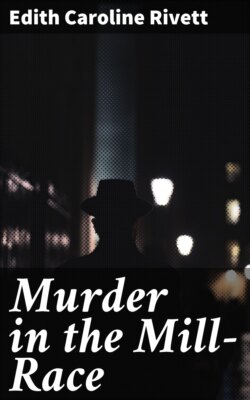Читать книгу Murder in the Mill-Race - Edith Caroline Rivett - Страница 9
На сайте Литреса книга снята с продажи.
1
ОглавлениеTable of Contents
One look at the Dower House had been enough for Anne. She knew a beautiful house when she saw one, and her heart rejoiced at the big sunny rooms, nobly proportioned and enriched with panelling and carven stone. She agreed with Raymond that the ground floor would suit them admirably and be easy to run: that the enormous old kitchens and the service stairs could be shut off and left to the owners as storage space, and that the garden was of manageable size. Anne had only had a few hours to inspect, measure and memorise her new home. Lady Ridding had shown both tact and commonsense in spending only a few minutes with her tenant-to-be, and had then sent in the bailiff to discuss the necessary adaptations, and he had proved to be reasonable and helpful. That had been in January. Now, on Lady Day, Raymond drove his wife from Milham Prior so that she could be at the Dower House when their goods arrived. It was a lovely morning: March winds scudded white clouds across the blue sky, and tossed the daffodils in poetic fashion: the sun shone on golden willow palm and budding greenery; away and beyond, the moorland made a tranquil background, fold upon fold of grey and brown and mauve like a far-off rampart against the sky.
Raymond had lost his qualm of the previous day: the sight of Anne’s face when he opened the front door of the Dower House was enough. Bare and clean, barred with sunshine and shadow from the mullioned windows, the rooms looked serene and welcoming and lovely. Anne went from white-panelled drawing-room to dark-panelled study, from honey-coloured bedroom to leaf brown of dining-room: inspected the Aga and the new stainless steel sink which had been installed in the old servery, the cupboard space in the one time butler’s pantry, and she whooped with joy over tiling and porcelain in the new bathroom.
“Ray, it’s marvellous! Everything’s been done quite perfectly. I’ll never scoff at the aristocracy again. The noblesse have jolly well obliged this time.”
“It looks pretty good to me,” he said. “Nothing makeshift or shoddy about.”
“I’m going to love this house so much, I shall never want to go away anywhere,” said Anne. “It’ll be a full-time job and a dream of delight simultaneously. Ray, come and sit on the window seat in the sunshine and tell me a bit more about people in the village. It’ll help such a lot if I can get them placed and learn their names before I meet them. I’m awful at names.”
“Right: let’s start with the hierarchy. Sir James and Lady R. You won’t forget them. I suppose the parson and his lady come next in the book of precedence: the Rev. Eversley and Mrs. Kingsley: he is thin and she is fat and I swear she bullies him. They’re both elderly, conservative to their marrow bones, and my guess is they’ll take a very poor view of anything in the way of progress or reform. Mrs. K. will certainly leave cards on you, so put out the salver. Other card leavers will be Col. and Mrs. Staveley of Monk’s Milham—two more old dodderers—and Miss Braithwaite of Coombedene. You may like her: old Brown says she talks like a Bolshie, which means she isn’t hidebound. So much for local gentry.”
“Give me a line on the village.”
“I don’t know too much about it myself, angel. The most important bodies I’ve heard of are Mrs. Yeo, who runs the Post Office, the village shop, W.I., M.U., and all the other worthy efforts. You’d better make friends with her, she’s a power in the village. The innkeeper is Simon Barracombe. He was once a butler and he looks it: too much hand washing and kowtowing for an innkeeper, but his wife takes in visitors, which may be useful if we want to ask folks to see us. You saw the bailiff—Sanderson. He struck me as a sound chap. If you want information, he’d probably be the best person to ask. Villages all have their private politics, and there’s generally some scandal or schism or what have you, and it’s often useful if you’re given a word off the record by someone who isn’t involved.”
“Yes, I think you’re right there,” said Anne. “I shall have to watch my step: newcomers are suspect in villages. Is that someone at the front door, Ray?”
“I didn’t hear anybody.”
Anne jumped up and ran across the room. The drawing-room, where they sat, faced south, as did the front door which stood wide open to the sunshine. Glancing through the open door of the drawing-room, Anne had been aware of a shadow in the wide entrance hall beyond. When she reached the hall she had to choke back an exclamation of astonishment. In the doorway, silhouetted against the sunlight, stood a figure so tall and dark and unexpected that Anne had a sudden qualm of discomfort, a sense that she was facing something unreal and utterly unlike anything she had ever known.
